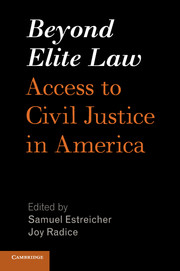Book contents
- Frontmatter
- Contents
- Beyond Elite Law
- Foreword
- List of Contributors
- Overview
- Overview
- PART I CURRENT STATE OF ACCESS TO LEGAL SERVICES
- 1 Access to Civil Justice in America: What Do We Know?
- 2 Life in the Law-Thick World: Legal Resources for Ordinary Americans
- 3 The Need for a National Civil Justice Survey of Incidence and Claiming Behavior
- 4 When Does Representation Matter?
- 5 Self-Representation and the Dismissal of Chapter 7 Bankruptcy Cases
- 6 Racial Disparities in Legal Representation for Employment Discrimination Plaintiffs
- 7 The Unemployment Action Center: A Student-Driven Response to a Legal Need
- 8 Immigrant Representation: Meeting an Urgent Need
- 9 Self-Representation, Civil Gideon, and Community Mobilization in Immigration Cases
- PART II SOURCES OF LEGAL SERVICES ASSISTANCE FOR WORKING AMERICANS
- PART III FASHIONING A REFORM AGENDA
- PART IV CREATING A CULTURE OF SERVICE
- Index
1 - Access to Civil Justice in America: What Do We Know?
from PART I - CURRENT STATE OF ACCESS TO LEGAL SERVICES
Published online by Cambridge University Press: 05 May 2016
- Frontmatter
- Contents
- Beyond Elite Law
- Foreword
- List of Contributors
- Overview
- Overview
- PART I CURRENT STATE OF ACCESS TO LEGAL SERVICES
- 1 Access to Civil Justice in America: What Do We Know?
- 2 Life in the Law-Thick World: Legal Resources for Ordinary Americans
- 3 The Need for a National Civil Justice Survey of Incidence and Claiming Behavior
- 4 When Does Representation Matter?
- 5 Self-Representation and the Dismissal of Chapter 7 Bankruptcy Cases
- 6 Racial Disparities in Legal Representation for Employment Discrimination Plaintiffs
- 7 The Unemployment Action Center: A Student-Driven Response to a Legal Need
- 8 Immigrant Representation: Meeting an Urgent Need
- 9 Self-Representation, Civil Gideon, and Community Mobilization in Immigration Cases
- PART II SOURCES OF LEGAL SERVICES ASSISTANCE FOR WORKING AMERICANS
- PART III FASHIONING A REFORM AGENDA
- PART IV CREATING A CULTURE OF SERVICE
- Index
Summary
Ian Weinstein reviews the body of research that describes what we know about access to civil justice for Americans of modest means. He looks at the problem from two perspectives: the demand side of those who present unmet civil legal needs and the supply side of providers that offer legal assistance to this population. Weinstein evaluates surveys that attempt to quantify the civil legal needs for this population and studies of how Americans fare when they represent themselves. The chapter closes with an inventory of the different civil legal service providers assisting Americans of limited means, from pro bono lawyers to government-funded legal aid organizations.
The crisis in access to justice for low- and moderate-income Americans has been the subject of renewed attention by the federal government, states, and private groups in recent years. There is also a renaissance of access to justice research, a body of work that illuminates many dark corners of our system of civil justice. While people of means have ready access to lawyers, the courts, and the burgeoning system of private dispute resolution, most low- and moderate-income Americans with legal problems either do not use the civil justice system at all attempt to navigate it on their own without counsel.
Since the mid-1970s, surveys conducted by the American Bar Association (ABA) and the Legal Services Corporation (LSC) have shown that 80% of the legal needs of low-income Americans and more than 50% of the legal needs of moderate-income Americans remain unmet. Data also confirm that underfunded civil legal aid providers must turn away many Americans who seek representation for their civil legal problems.
But even as we learn more, there remain many gaps in our understanding of how the market, regulatory policy, legal rules, and social forces shape the supply of legal services. The first part of this chapter will present what we know about the need or demand for legal services among low- and moderate-income Americans, and the second part will describe the sectors of the legal profession that provide these services. Viewed from both demand and supply perspectives, the crisis in access to civil justice in America presents a clear challenge to our commitment to justice.
- Type
- Chapter
- Information
- Beyond Elite LawAccess to Civil Justice in America, pp. 3 - 20Publisher: Cambridge University PressPrint publication year: 2016
- 2
- Cited by



